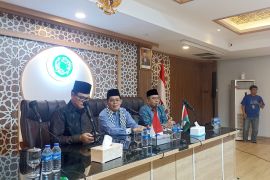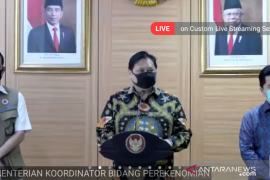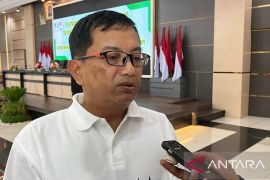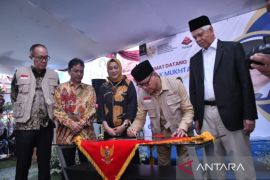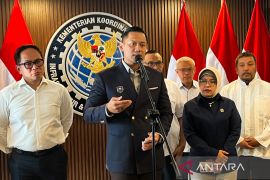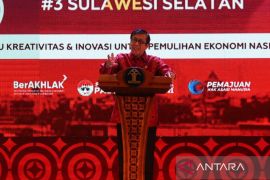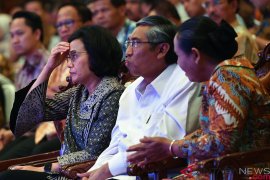The figure is slightly higher than the economic growth forecast of 5 percent for East Asia and the Pacific.
Several countries, such as Malaysia and Indonesia, have not been too vulnerable to a commodity price hike caused by the war.
China, Indonesia, and Vietnam have passed the pre-pandemic output level currently, while Cambodia, Malaysia, Mongolia, the Philippines, and Thailand are expected to do that later this year, according to the World Bank.
World Bank chief economist for East Asia and the Pacific, Aaditya Mattoo, said that various upheavals caused by the war and related sanctions could have the most concrete impact on the East Asia and Pacific region, including commodity supply disruptions, rising pressure on the financial sector, and declining global trust.
The East Asia and Pacific region's direct dependence on Russia and Ukraine for the import and export of goods and services and capital is still limited, but the war and related sanctions will likely raise food and fuel prices on an international scale—at the expense of consumers and growth.
Commodity-exporting countries, such as Indonesia and Malaysia, can stem the international price hike more easily than commodity importing countries, such as Fiji and Thailand.
For this, Mattoo suggested that the governments of East Asian and Pacific countries reconcile their spending needs on account of the increasingly tighter budget limitation through a commitment to recover fiscal discipline and re-apply fiscal regulations, as planned by Indonesia in 2023.
Related news: Indonesia prepares for economic impact of Russia-Ukraine conflict
Meanwhile, President Joko Widodo (Jokowi) has directed that 40 percent of the state budget (APBN), regional budget (APBD), and state-owned enterprises (SOEs) budget be used for purchasing domestic products.
"Just use 40 percent of those budgets to trigger our economic growth from central government to local government,"he urged.
The head of state noted that the central government has a procurement budget of Rp526 trillion, while each province, city, and district government has a budget of Rp535 trillion, and SOEs have a budget of Rp420 trillion. He then asked them to allocate 40 percent of their budget spending to purchase domestic products.
If 40 percent of the budget is used for procuring domestic products, then SOE spending could boost economic growth up to 0.4 percent, while procurements through state and regional budgets could boost economic growth from 1.5 to 1.7 percent, Widodo explained.
"We do not need to find investors; we must consistently buy goods produced by factories, industries, our micro, small and medium enterprises (MSMEs)," he emphasized.
He also asked ministries and local governments to stop buying imported goods.
"Do we want to continue buying imported goods? No. We cannot. By buying imported goods, meaning we are giving jobs to other countries. Our money and capital outflow will go directly to other countries," he remarked.
If ministries, regional governments, and SOEs purchase domestic goods, there would be additional capital and investment by domestic entrepreneurs that could open more job opportunities, he said.
It has been calculated that this could open up two million jobs, he added.
The President also said that not all parties have actually spent their budget on domestic product purchases.
"We just ask 40 percent of your budget for domestic products until May 2022. This morning, I checked, it was only Rp214 trillion. If it is already at Rp400 trillion, then it will be good,"he remarked.
Related news: Use local goods to compete against foreign products: minister to MSMEs
Meanwhile, Coordinating Minister for Maritime Affairs and Investment, Luhut Binsar Pandjaitan, is targeting to increase domestic product spending (PDN) by the government through e-catalogs to Rp500 trillion this year, higher than the previous target of Rp400 trillion.
"Government spending on domestic products (PDN) in 2022 is targeted at Rp400 trillion and we previously reported it to the President, if we can continue to increase it maybe to Rp500 trillion in April and be completed in May 31, then the figures on economic growth will be visible this year," Pandjaitan stated.
Pandjaitan explained that based on the calculation of Statistics Indonesia (BPS), if Rp400 trillion of government spending is spent domestically, then it would encourage economic growth of around 1.6 percent to 1.7 percent.
"The government has estimated economic growth of around 5.0-5.2 percent this year. With the addition of 1.0 percent to 1.7 percent, our economic growth will be around 6 percent more,"he stated.
This action will be able to create demand for domestic products and strengthen supply through capacity building for industrial development and new investment.
"Ï think this is very good because the government is the biggest buyer,"he affirmed.
To support the commitment of spending on domestic products, the government has continued to encourage the acceleration of the formation of the Team for Increased Use of Domestic Products (P3DN Team) across Indonesia, complementing the existing ones in 25 ministries/institutions, 8 state-owned enterprises, and 103 regional governments.
Furthermore, the National Public Procurement Agency (LKPP), Ministry of Industry, Ministry of Home Affairs, and Ministry of Finance have made improvements to the government's digital shopping ecosystem to support the acceleration of non-cash payments through government credit cards with QRIS (Quick Response Code Indonesian Standard).
"With a government credit card, it will reduce our costs by approximately 20–30 percent. Hence, whether we like it or not, it will be more efficient in future," the coordinating minister stated.
The government is preparing an e-catalog for the procurement of goods and services to absorb domestic products. The electronic catalog currently features 200 thousand local products and is targeted to have one million products by the end of 2022.
The Affirmation Act of the Proud of Indonesian Products was preceded by a business-matching event for domestic product purchases on March 22–24 2022, which resulted in deals worth Rp85 trillion.
Based on the simulation results conducted by Statistics Indonesia (BPS), purchasing domestic products worth Rp400 trillion could increase national economic growth by 1.67 to 1.71 percent.
If economic growth in Indonesia was 3.69 percent in 2021, then, by maximizing the use of domestic products, the Indonesian economy can be boosted up to 5.36 percent.
Related news: Affirmative action will drive domestic production: Minister Plate
Related news: Bandung city gov't ready to spend municipal budget to MSMEs
Editor: Suharto
Copyright © ANTARA 2022

